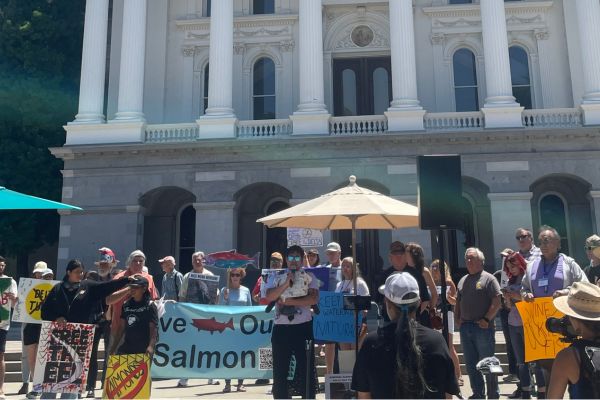
- Details
- By Darren Thompson
On Wednesday, July 5, several northern California Tribes and conservation organizations hosted a rally at the California State Capitol grounds in Sacramento to demonstrate that they want a clean water future.
More than 200 people attended the rally, asking California Governor Gavin Newsom (D) to include Tribal communities when decisions are made about allocating water.
“We got the idea to put together a day of action to bring together all these communities, Tribal communities, environmental justice communities, conservation groups, fishing interest groups, to let the state, the governor, state agencies, federal agencies that we are all in this together,” said staff attorney for Save California Salmon, Kasil Willie, in an interview with Native News Online. “We’re working towards a common goal—restoring watersheds and ecosystems.”
“We’re advocating to get water justice into the mainstream conversation of how policies and regulations are made,” said Willie, who’s also an enrolled Walker River Paiute citizen. “In California, the ones with the oldest water rights are those who are white, and the majority of them are male as well.”
In addition to conserving a fragile ecosystem, organizers say that they are also advocating for water justice to include all Tribal communities who rely on water. Water rights, and protections of water, did not include the voices to protect fish populations for subsistence or cultural rights of Native people. For example, there are some ceremonies that require participants to consume salmon or fish.
Climate change has contributed to an extended drought in northern California, and as a result, many water systems have a lower water supply. According to the state of California, January, February, and March were the driest months in the state in more than 100 years. Salmon populations have shrunk, and conservation organizations want to restore their habitat.
During the last few years of the drought in northern California, the salmon run was lower than expected, and fishing, both subsistence and commercial, has been halted. The National Marine Fisheries Service announced in March that salmon fishing would be canceled for the rest of the 2022-23 fishing season off the Pacific Coast from Cape Falcon in northern Oregon to the California-Mexican border. The NMFS also announced that salmon fishing was halted off the California coast until 2024, all in efforts to protect the endangered salmon.
“California’s salmon and river people are done watching our rivers be drained and fish killed so millionaire farmers can water almonds and alfalfa,” said Regina Chichizola, Save California Salmon’s Executive Director, in an interview with Native News Online. “California is a salmon state. The governor and [U.S. Department of] Interior cannot promise truth and justice for California’s Native people and kill our rivers and salmon.”
According to the Almond Board of California, about 1.5 million acres are dedicated to irrigated almond orchards, where a majority of production is exported outside of the country. The allocation of water has led to reduced flows through California rivers and the Bay Delta and created lower water quality for Tribes and other underserved communities in the San Francisco Bay Delta. As a result, harmful algal blooms have spread and have contributed to the depopulation of native fish species like Chinook salmon.
Other concerns the rally brought attention to were the Delta Conveyance Project, a state water infrastructure project aimed to update the state’s aging water delivery system in northern California. According to organizers, Gov. Newsom has tried to fast-track the project without consulting with Tribes who have cultural resources, or history, along the project’s route.
According to the state, Tribes that have requested consultation include California Valley Miwok
Tribe (Sheep Ranch Rancheria of Me-Wuk Indians of California), Ione Band of Miwok Indians, Northern Valley Yokuts Tribe, Shingle Springs Band of Miwok Indians, United Auburn Indian Community, Wilton Rancheria, Winnemem Wintu, Wintu Tribe of Northern California, and the Yocha Dehe Wintun Nation.
“We are coming together for water justice, and we are just getting started,” said Chichizola of the day’s events.
The Shingle Springs Band of Miwok Indians, Winnemem Wintu Tribe, Hoopa Valley Tribe, Karuk Tribe, Round Valley Indian Tribes, Pit River Tribe, Mechoopda Indian Tribe, Sogorea Te’ Land Trust, Restore the Delta, Save California Salmon, Golden State Salmon Association, Sacred Places Institute, California Indian Environmental Alliance, Little Manila Rising, Indigenous Justice, San Francisco Baykeeper, North Coast Native Protectors, Sierra Club California, Friends of the River, and Tuolumne River Trust all participated in the “Day of Action” on Wednesday.
More Stories Like This
Trump signs law that revokes some limits on drilling in Alaska’s National Petroleum ReserveSouthern Sierra Miwuk Nation Gets 900-Acres ofLand Back
Chilkat Indian Village Tells New Palmer Mine Owners They Are “Not Welcome” in Chilkat Valley
Tribes, Coastal Group Ask Army Corps to Revoke Permit for Texas Export Terminal
Michigan Tribes Tell Supreme Court: Don’t Bail Out Enbridge
Help us defend tribal sovereignty.
At Native News Online, our mission is rooted in telling the stories that strengthen sovereignty and uplift Indigenous voices — not just at year’s end, but every single day.
Because of your generosity last year, we were able to keep our reporters on the ground in tribal communities, at national gatherings and in the halls of Congress — covering the issues that matter most to Indian Country: sovereignty, culture, education, health and economic opportunity.
That support sustained us through a tough year in 2025. Now, as we look to the year ahead, we need your help right now to ensure warrior journalism remains strong — reporting that defends tribal sovereignty, amplifies Native truth, and holds power accountable.
 The stakes couldn't be higher. Your support keeps Native voices heard, Native stories told and Native sovereignty defended.
The stakes couldn't be higher. Your support keeps Native voices heard, Native stories told and Native sovereignty defended.
Stand with Warrior Journalism today.
Levi Rickert (Potawatomi), Editor & Publisher

